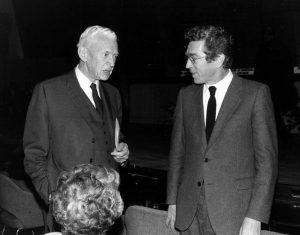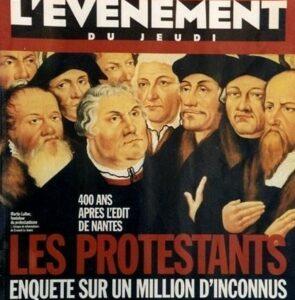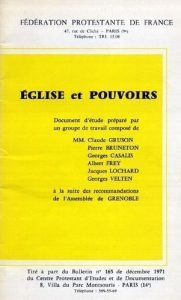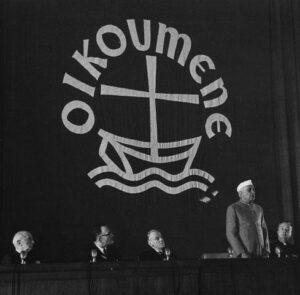Was the assertion that Protestants voted for the left wing still true in the second half of the 20th century ?
Successive surveys or opinion polls seemed to confirm the trend showing that 50% to 52% of Protestants voted for the left wing and mainly the socialist party – according to a CSA survey in 1995 ; 40% for the right wing, and about 9% for the ecologists. Religious diversity, often a factor in French voting, rather than age or socio-professional diversity, persisted, but was declining.
In 1978 a survey among pastors showed that 52.3% voted left wing, 18.9% right wing and 5.3% ecologist. In 1977 a similar SOFRES survey among Catholic priests showed inverted percentages, namely 30% voted left wing, 66% right wing and 4% green.
Membership of different churches also made a difference ; for instance 66% of Reformed church pastors were left-wingers, 54% of the Lutherans too, but in the charismatic and evangelical streams, 31% were left wingers and 27% right wingers.
But trends varied
Trends varied according to the regions as could be seen with the many votes for the extreme right wing National Front in Alsace, and the enduring communist vote in parts of the Cévennes region.
Above all they varied according to periods which have marked French political history since the end of World War II. They can be summed up as follows :
At the time of the Liberation, between the communist party (« Parti des fusillés » – lit. The gunned down) and the Popular Republican Movement (MRP) clearly on the Catholic side, the political influence of Protestantism, still felt during the Third Republic, totally disappeared. However, Catholic influence, weakened by the modernist crisis and the law of separation between churches and state, thrived once more.
One example : when the national council of the French Reformed Church, affirming its attachment to the principle of the secular state, criticised the subsidising of private schools by the state, initiated by the Vichy regime, and then institutionalised in 1950, it was ignored.
Gaullism represented another path. In a desire to restore France’s credibility after the Vichy regime, General de Gaulle created in 1947 the Rassemblement du peuple français (RPF -Union of the People of France). It was meant to be above the traditional parties which he deemed discredited at the end of the 3rd Republic. After breaking away from the MRP (Popular Republican Movement) of the 4th Republic, Gaullism transcended the usual themes opposing right- and left-wingers. It was not to be confounded with the classical right-wing, but proved to have a real talent for seducing left-wingers. At various times, from 1945-1946 and then from 1958 to1969, Protestants held high positions around the General, the most striking example being that of Maurice Couve de Murville, Foreign Affairs Minister from 1958 to 1969, and Prime Minister in 1968 and 1969. Others fought against him, especially against his politics towards Algeria, such as Jacques Soustelle a fervent defender of French Algeria, or on the contrary, those who were opposed to the war.
After François Mitterand was elected President of the Republic in 1981, a number of Protestants, whether they admitted their religious membership or not, held important political responsibilities, a fact which the press frequently underlined.
The political diversity of French Protestantism
The political diversity of French Protestantism is a fact. Paul Ricoeur believes it stems from its double origins, on the one hand Cévenol and revolt of the peasants opposed to the state and on the other hand a sort of Calvinist attitude « We are the thinkers of the State ». Historical Gaullism, like the self-managed socialism of the 1960s can be assimilated with the first ; Protestants in high positions in the administration and the ministers appointed by Mitterand, with the latter.
The sociologist Jean Paul Willaime presented another view and found two separate trends among the Reformed. The first, in the majority, was in favour of an ethical and political presence in the world, since Christianity cannot be lived without commitment. The second one, in the minority, is attracted to liturgical and moral conservatism. Can both trends still be seen in the main political tendencies ? Judge for yourself.
In any case, Protestantism has tended to become more and more diversified :
- The « historical » Protestants (members of the Reformed Church of France (ERF) have remained integrated in civil society and faithful to the secular and republican tradition.
- Evangelical and newly converted Protestants from other religions, or from those with no religion, are not as close to the tradition, but closer to Anglo-Saxon pragmatism.
- Protestants in Alsace are not as left wing, but sensitive to ecology, similar to Protestants in Northern Europe.
The assertion « protestant=left wing » is still partly true, but slowly decreasing under identified sociological pressures. The Protestant minority, while it had strongly influenced the 3rd Republic, has become reintegrated and normalised, losing its political identity. As J. P. Willaime said « having challenged ecclesiastic authority the Protestants are not going to accept it in politics ».





